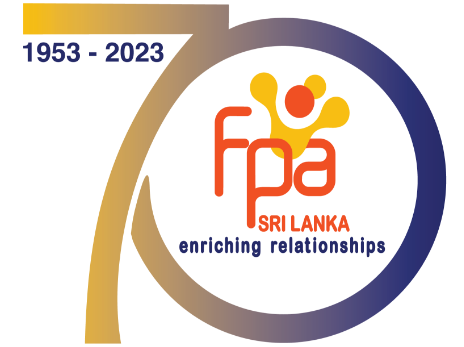STRATEGIC FRAMEWORK
Boldly Beyond Boundaries; FPA Sri Lanka Strategy
(2023-2028)
FPA Sri Lanka's compass is pointing in a new, bold direction. With "Boldly Beyond Boundaries", we promise to take on new challenges, break through barriers, and change how we approach sexual and reproductive health in our country.
Imagine a Sri Lanka where everyone, regardless of identity or location, has the undeniable right to Sexual and Reproductive Health rather than it being a luxury. "Boldly Beyond Boundaries" is our pledge to go above and beyond to make sure that Sexual and Reproductive Health services impact every member of our diverse society. This theme aligns with our mission and inspires us to advocate boldly for Sexual and Reproductive Health rights while maintaining our efforts with unwavering volunteerism that knows no bounds, improving life for all.
Four pillars form the core of this theme, each of which reflects our commitment to redefining Sexual and Reproductive Health. "Boldly Beyond Boundaries" spurs us to go beyond boundaries to ensure that everyone has equitable access to high-quality services, regardless of age, gender, ethnicity, religion, socioeconomic status, or geographic location. It also calls for us to embrace advanced digital self-care.
As we navigate the sexuality agenda beyond conventional boundaries, advocacy, changing and challenging norms, and youth empowerment become our compass. Pillar 3 stands for the power of partnerships, building alliances, collaborations, supporting social movement, innovation, and knowledge sharing. It reiterates our dedication towards establishing strategic alliances and working together across sectors, transcending conventional boundaries. Last but not least, Pillar 4 encourages us to be transparent, resilient, sustainable, diverse and bold so that FPA Sri Lanka continues to impact well into the future and goes beyond traditional organizational boundaries.
"Boldly Beyond Boundaries" is more than just a plan; it's our journey toward a dynamic future in which Sexual and Reproductive Health is a right for all. It serves as our catchphrase, inviting everyone to join us as we embark on this visionary course. Together, let's make our commitment to ensuring that Sexual and Reproductive Health and Rights are a reality for every person in our diverse country. Join us as we forge ahead towards a healthier, more inclusive, and empowered Sri Lanka.
Strategic Pillars and Pathways
In the heart of FPA Sri Lanka's visionary strategy, "Boldly Beyond Boundaries," lie four robust pillars, each designed to chart a transformative course in the realm of Sexual and Reproductive Health (SRH). Pillar 1, "Center Care on People," envisages a Sri Lanka where access to quality SRH services knows no bounds. Through pathways like "Widen Access," "Expand Choice," and "Advanced Digital Self-Care," the focus is on equitable service provision, sustainability, and innovative digital platforms, ensuring that no corner of the nation remains underserved. Pillar 2, "Move the Sexuality Agenda," puts advocacy at the forefront, aiming to reshape societal norms and engage with Sri Lanka's youth. "Ground Advocacy," "Shift Norms," and "Act with Youth" are the pathways that underscore FPA Sri Lanka's commitment to creating a progressive legal environment, fostering gender equality, and empowering the youth with comprehensive SRH education and services. Pillar 3, "Solidarity for Change," is a departure from conventional thinking, emphasizing partnerships to support the SRH movement. Through pathways like "Support Social Movements," "Build Strategic Partnerships," and "Innovate and Share Knowledge," FPA Sri Lanka envisions leveraging inter-sectional themes, strategic collaborations, and knowledge building & sharing to address not just SRH but also the inter sectional issues like climate change, pandemics and poverty. Pillar 4, "Nurture our Association," turns the focus inward to strengthen FPA Sri Lanka itself. With pathways such as "Chart Our Identity," "Grow Our Association," and "Walk the Talk," the aim is to position FPA Sri Lanka as a leading SRHR service provider, advocate, and NGO, ensuring financial sustainability, diversity, and inclusivity while fostering a fearless and effective organizational culture.
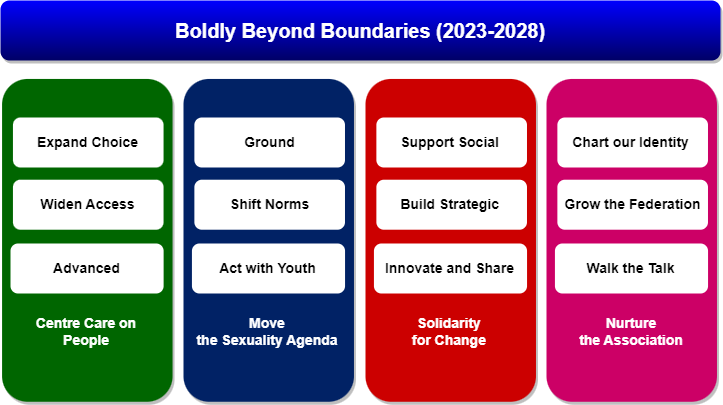
Pillar 1: Center Care on People
Pillar 1 is about widening access to services, expanding choice and to explore the benfits of digital health platforms to drive the FPA agenda. As a country we still have pockets where our services are needed (service gaps). Often these are in the harder to reach provinces such as Uva Province deep in the interior, and the North of the country. Our focus now, along with the Government, is to only focus on these service gaps, since there is an effective, robust system working in the rest of the country.
We need to keep doing what we are doing but increase focus on those under-served pockets in the new strategy.
In addition, and whilst exploring more effective and convenient ways to reach people through technology, we aim to be the first to bring new products to the market, the male contraceptive pill for example and HIV self-test kits and for these products to be available over the counter or online.
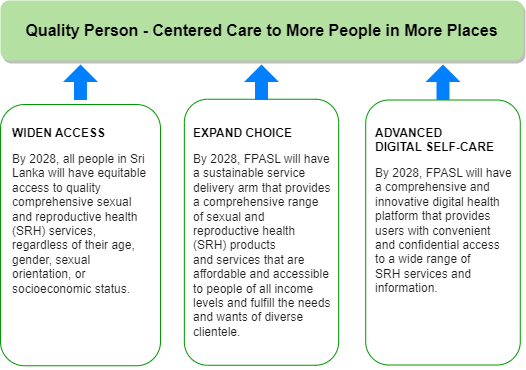
Widen Access
Objective: By 2028, all people in Sri Lanka will have equitable access to quality comprehensive sexual and reproductive health (SRH) services, regardless of their age, gender, sexual orientation, or socioeconomic status.
The strategic pathway of “Widen Access” aims to ensure equitable and quality comprehensive sexual and reproductive health (SRH) services for all individuals in Sri Lanka by 2028. This includes addressing barriers and disparities in SRH service access, reaching underserved populations, and expanding geographical coverage. Widen access pathway involve increasing access to SRH services for all, updating guidelines and SOPs for streamlined service provision, and improving access to SRH services and products in hard-to-reach communities and humanitarian settings. Strengthening community partnerships and networks with a focus on adolescents, people with disabilities, and the elderly is prioritized.
Training and sensitization of all involved in the SRH supply chain are emphasized to provide stigma-free services. Additionally, universal screening for SGBV and dedicated services for victims will be strengthened. Improving static clinic service delivery into a cost-recovery model with a "no refusal policy" is a priority.
Expand Choice
Objective: By 2028, FPASL will have a sustainable service delivery arm that provides a comprehensive range of sexual and reproductive health (SRH) products and services that are affordable and accessible to people of all income levels and fulfill the needs and wants of diverse clientele.
FPASL's strategic pathway, called Expand Choice, focuses on creating a sustainable service delivery arm that provides affordable and accessible SRH products and services. By 2028, the organization aims to cater to the diverse needs of its clientele, ensuring that people from all income levels have access to a wide array of SRH options. To achieve this, FPASL emphasizes understanding market dynamics and developing effective strategies for new product development that meet evolving client needs. The organization plans to expand its market share and product portfolio beyond contraceptives, offering HIV test kits, STI test kits, and prep to aims to introduce innovative service delivery channels such as Online-to-Offline, Home visits, Home delivery, and Home care to enhance accessibility and convenience for clients. FPASL seeks to strengthen its Service Delivery Points (SDPs) by providing comprehensive IPES PLUS service packages, including subfertility services, cervical cytology analysis, and ultrasound scanning for breast cancers. This holistic approach ensures clients receive integrated and specialized care. The vision of Expand Choice is to special is individuals with a diverse range of SRH options, empowering them to make informed decisions about their sexual and reproductive health. By focusing on sustainability, innovation, and comprehensive service provision, FPASL aims to contribute to healthier and empowered communities.
Advanced Digital Self-care
Objective: By 2028, FPASL will have a comprehensive and innovative digital health platform that provides users with convenient and confidential access to a wide range of SRH services and information.
FPASL's strategic pathway, Advanced Digital Self-Care, focuses on revolutionizing SRH services through an innovative digital health platform. By 2028, FPASL aims to provide users with convenient and confidential access to a wide range of SRH services and information, empowering individuals to take control of their health. The pathway emphasizes introducing digital platforms that streamline access to services and information, offering a one-stop solution for users. By leveraging technology, FPASL seeks to enhance user experience and ensure comprehensive SRH services and information are readily available.
To strengthen digital healthcare, FPASL plans to develop guidelines, policies, and standard operating procedures (SOPs) aligned with national guidelines. Compliance and best practices will ensure safe and reliable digital health services. Integration of the "Happy Life Contact Centre" with the National STD/AIDS Control Programme's Know4sure.lk platform will expand the reach of FPASL's services to the Most at Risk Population for HIV. Additionally, FPASL aims to develop a mobile application that allows users to conveniently and discreetly order and receive social marketing products. Through Advanced Digital Self-Care, FPASL envisions a future where individuals can access comprehensive SRH services and information through user-friendly digital platforms. By embracing technology and digital innovations, FPASL aims to empower individuals with knowledge and choices, fostering a healthier and more informed society.
Pillar 2: Move the Sexuality Agenda
Pillar 2 is predominantly around advocacy, it works towards shifting norms, including archaic laws and the penal code and about engaging with Sri Lanka’s youth. In the past, FPA have struggled to make progress in this area during the last strategic planning period for a number of reasons, not least the Global pandemic and economic and political instability in the country. There are positive indications that a repeal of the penal code around same sex criminalisation is imminent. But much work is still to be done to liberalize the abortion laws to include incest and severe foetal abnormalities, for example, to include rape of the male child as a criminal. For this, we need to assert and affirm ourselves, sensitize and increase knowledge of service providers and empower those who are vulnerable.
Another area for advocacy includes working with muslim and women CSOs to bring about a change to Muslim Marriage Laws that permit forced marriage of underage girls, especially in the Eastern Province.
Advocacy, education and engagement of youth is a key component of our 2028 strategy. Young people are sexually active and because CSE is weak or unavailable, they learn about sex from the internet. This can be misleading, provocative and even damaging. When youth are properly informed about their bodies at the right time, they can make good decisions. Many parents, teachers and religious leaders are in denial for cultural reasons.
FPA needs to engage youth through a positive and engaging communications strategy that stems from a re-branding to attract youth by being relevant to their world and their needs.
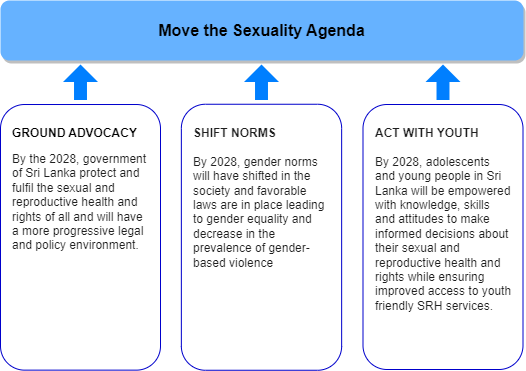
Ground Advocacy
Objective: By 2028, government of Sri Lanka protect and fulfil the sexual and reproductive health and rights of all and will have a more progressive legal and policy environment.
The strategic pathway of Ground Advocacy sets forth an ambitious vision for the future of sexual and reproductive health and rights (SRHR) in Sri Lanka. By 2028, the government of Sri Lanka aims to protect and fulfill the SRHR of all citizens and establish a more progressive legal and policy environment. This pathway outlines a series of strategic objectives and advocacy initiatives aimed at effecting transformative changes in the country's legislative and policy landscape. By collaborating with key stakeholders, including the Parliament, Ministry of Justice, Civil Society Actors (CSOs), Ministry of Finance, and Family Health Bureau (FHB), FPASL endeavors to make a lasting impact on the lives of people in Sri Lanka. One of the key objectives is to advocate with the Parliament to decriminalize abortions under statutory rape, incest, and fetal abnormality conditions by amending the current law on abortion (303/304). This move is aimed at ensuring access to safe and legal abortion services for vulnerable individuals. Furthermore, FPASL seeks to collaborate with the Ministry of Justice and CSOs to repeal the vagrancy ordinance, thereby safeguarding the rights of sex workers and preventing the misuse of this law against them. Addressing period poverty is another crucial aspect of this pathway, with FPASL aiming to advocate for tax exemptions or reductions on menstrual products by engaging with the Ministry of Finance and other key stakeholders. Lastly, FPASL is committed to working with the Family Health Bureau and other stakeholders to sign the FP 2030 commitments, demonstrating the government's dedication to achieving SRHR-related targets and ensuring that these commitments are effectively met.
Shift Norms
Objective: By 2028, gender norms will have shifted in the society and favourable laws are in place leading to gender equality and decrease in the prevalence of gender-based violence.
The strategic pathway of Shift Norms outlines an ambitious vision for Sri Lankan society, aiming to achieve gender equality and reduce the prevalence of gender-based violence by 2028. This pathway recognizes the need for transformative changes in societal norms and the legal framework to create a more inclusive and equitable society. Advocacy efforts include collaborating with Muslim women organizations and other stakeholders to reform the Muslim Marriage and Divorce Act (MMDA) and ensure gender equality within the Muslim community. Additionally, FPASL aims to work with feminist women's organizations and the Ministry of Justice to criminalize marital rape by incorporating it into the penal code, acknowledging the importance of consent within marriage. Advocate for the passage of the gender equality bill and the Empowerment of Women bill in parliament, working closely with the Ministry of Women's Affairs and the national GBV forum. Sensitizing the general public on gender-related norms is a crucial aspect of this pathway, aiming to foster increased societal support for preventing sexual and gender-based violence while promoting gender equality.
Act with Youth
Objective: By 2028, adolescents and young people in Sri Lanka will be empowered with knowledge, skills, and attitudes to make informed decisions about their sexual and reproductive health and rights while ensuring improved access to youth friendly SRH services.
The Act with Youth strategic pathway, it aims to empower adolescents and young people by providing them with comprehensive sexual and reproductive health (SRH) education and accessible SRH services. FPASL collaborates with the Ministry of Education to revise the health science curriculum, ensuring the inclusion of age-appropriate SRH education and increased dedicated periods for health science. This equips young people with the knowledge and skills needed to make informed decisions about their sexual health.FPASL also works with the Ministry of Health, Ministry of Education, and other stakeholders to deliver quality comprehensive sexuality education to both in-school and out-of-school youth. By forming partnerships, they aim to reach a wide range of young people, providing accurate information and promoting healthy behaviors. Additionally, FPASL recognizes the importance of enhancing the capacity of service providers to deliver youth-friendly SRH services. Collaboration with technical institutions and stakeholders supports training and skills development, ensuring the accessibility and quality of SRH services for adolescents and young individuals.
The Act with Youth strategic pathway envisions a future where young people are informed, empowered, and have access to comprehensive SRH services. By focusing on education and collaboration, FPASL strives to enable young individuals to confidently navigate their sexual and reproductive health, fostering a healthier and inclusive society.
Pillar 3 Solidarity for Change
Pillar 3 focuses on partnerships to support the movement. In many countries, SRHR is already an achieved goal, and this has caused donors to assume that other development is also taking place. This has made it almost impossible for small CSOs and NGOs focussing on the sexuality agenda, to survive. Pillar 3 is a departure from this thinking as it recognises the relationship between population growth and issues such as climate change, pandemics, poverty and food security. By strengthening the movement through inter-sectional themes, creating strategic partnerships and sharing knowledge and technology, we can leverage greater resources and create meaningful long-term impact in the country.
The challenge will be to strengthen and support CSO involvement without losing the trust and goodwill of the Government, which has not had the best of relationships with civil society in the past. This might result in us moving outside of our comfort zones, leveraging our strong relationships with Government Institutions to speak with a louder voice in support of a cause that is of National interest.
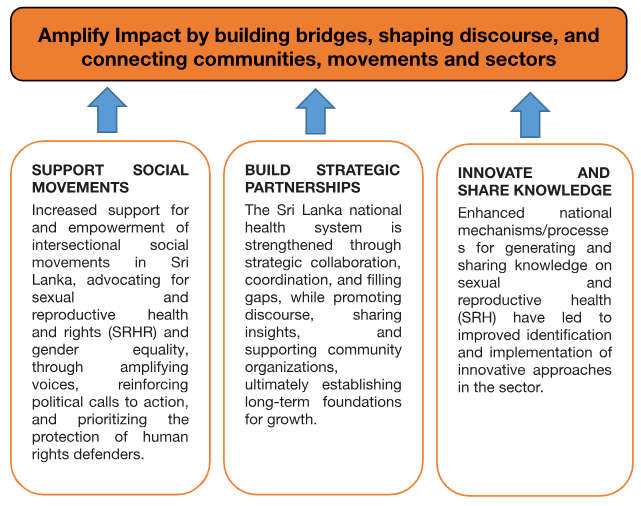
3.1. Support Social Movements
Objective: Increased support for and empowerment of intersectional social movements in Sri Lanka, advocating for SRHR and gender equality, through amplifying voices, reinforcing political calls to action, and prioritizing the protection of human rights defenders.
The strategic pathway of Support Social Movements focuses on bolstering intersectional social movements in Sri Lanka that advocate for SRHR and gender equality. By amplifying voices, reinforcing political calls to action, and prioritizing the protection of human rights defenders, FPASL aims to drive significant positive change in the realm of SRHR.
To ensure effective coordination and cooperation, FPASL intends to establish and strengthen national and district-level multi-sectoral steering committees on SRH. By partnering with government and non-governmental organizations, these committees will drive collaborative efforts in advancing SRHR and gender equality. Communication and advocacy are crucial components of this strategic pathway. FPASL aims to enhance its communication strategy to empower and advance social movements for SRHR. By implementing inclusive communication approaches, stakeholders will be engaged, and broad public support will be garnered. A national network of SRHR journalists will be created through collaboration with young journalists and technical institutions. This network will facilitate knowledge exchange, capacity-building, and impactful storytelling, effectively raising awareness and advocating for SRHR issues. Partnerships with independent content creators and influencers will further bolster advocacy efforts. By educating them on SRHR laws and procedures, they will be equipped to raise awareness and advocate effectively, amplifying the message of SRHR and gender equality to a broader audience.
3.2. Build Strategic Partnerships
Objective: The Sri Lanka national health system is strengthened through strategic collaboration, coordination, and filling gaps, while promoting discourse, sharing insights, and supporting community organizations, ultimately establishing long-term foundations for growth.
The strategic pathway of "Build Strategic Partnerships" aims to strengthen the Sri Lanka national health system through strategic collaborations and coordination, fostering long-term growth in sexual and reproductive health (SRH) outcomes. By promoting discourse, sharing insights, and supporting community organizations, this pathway seeks to enhance SRH services and establish a solid foundation for future improvements.
Key strategies include forging partnerships with the National Institute of Education (NIE) to enhance SRH education in schools and communities, ensuring individuals have the knowledge to make informed decisions about their sexual health. Additionally, a collaborative network of diverse civil society organizations (CSOs) and community-based organizations (CBOs) will be established to implement intersectional strategies for advancing SRHR. National and District-Level Multi-Sectorial Steering Committees on SRH will be formed, involving government and non-government organizations, fostering coordinated planning and evidence-based decision-making for comprehensive SRH outcomes. Empowering community-led initiatives is emphasized, with support provided for capacity building, resource mobilization, knowledge sharing, advocacy, and monitoring.
3.3. Innovate and Share Knowledge
Objective: Enhanced national mechanisms/processes for generating and sharing knowledge on SRH have led to improved identification and implementation of innovative approaches in the sector.
The "Innovate and Share Knowledge" pathway aims to enhance national mechanisms and processes for generating and sharing knowledge on sexual and reproductive health (SRH) to drive innovation and sector improvements. Key strategies include strengthening the information management system for monitoring and evaluation, promoting collaboration with stakeholders, establishing a leading research institution, and creating a national knowledge hub. The pathway seeks to foster a culture of innovation by forming a working committee to identify and develop actionable plans. It also emphasizes integrating SRH services and information into other sectors, such as for differently-abled individuals and the elderly. By leveraging research, collaboration, and technological advancements, this pathway aims to implement innovative approaches that enhance SRH and contribute to the well-being of individuals and communities.
Pillar 4: Nurture our Association
Pillar 4 looks inward towards the Federation and its members. For FPA this focuses on operational and programmatic strengthening to achieve the changes to legal statutes, social norms and attitudes, deliver quality services and products and achieve financial independence and sustainability.
FPA have done well, we are premier non-governmental organization working in Sexual and Reproductive Health and Rights in the country. But how can we now be more open about our Mission and our purpose? Up til now we have stayed below the radar but we need to assure that we stay relevant and alive for the next 30 years.
This requires us to look seriously at our financial sustainability, to increase income from non-SRHR services (such as sales of condoms and our real estate). Tthat have given us stability during difficult times. We need excellent systems and the right people - people who walk the talk; who believe in and an operate from a values perspective, because they believe in these values.
We aim to introduce more young people, both as volunteers and as staff members, because they change the culture of the organisation. Most importantly we need a fearless youngster leading the organisation.
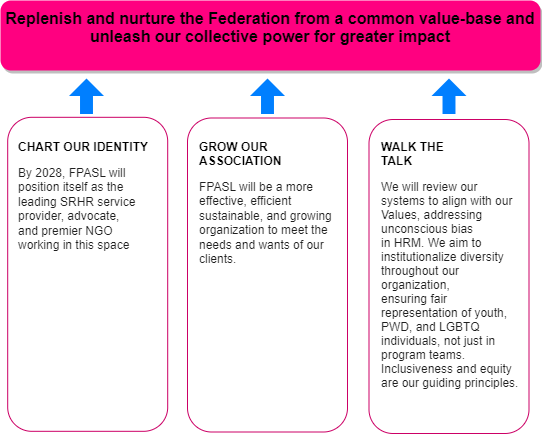
4.1. Chart our Identity
Objective: By 2028, FPASL will position itself as the leading SRHR service provider, advocate, and premier NGO working in this space The "Chart Our Identity" pathway focuses on positioning FPA Sri Lanka as the leading provider of sexual and reproductive health and rights (SRHR) services and a prominent advocate in the field. To achieve this by 2028, the pathway emphasizes enhancing community perception, rebranding the organization, and building capacity among staff, volunteers, and partner organizations.
The pathway begins with understanding the community's perception of FPASL and identifying areas for improvement. This information will inform a rebranding effort that aligns the organization's vision, mission, and core values with stakeholders' expectations. Capacity-building activities will be conducted to ensure everyone involved understands and upholds the values and principles of SRHR. FPASL will actively increase its visibility by participating in key initiatives and leading advocacy events related to legal, social, and cultural shifts in the SRHR landscape. By doing so, the organization aims to establish itself as a prominent advocate and a leader in the field.
Overall, the "Chart Our Identity" pathway seeks to strengthen FPASL's position in the SRHR sector, enhance its advocacy efforts, and make a significantly improve sexual and reproductive health and rights of individuals in Sri Lanka.
4.2. Grow our Association
Objective: FPASL will be a more effective, efficient sustainable, and growing organization to meet the needs and wants of our clients.
The strategic pathway of "Grow Our Association" aims to transform FPASL into a more effective, efficient, sustainable, and growing organization to meet the needs and wants of its clients. The pathway encompasses a series of strategies that focus on expanding the organization's reach, enhancing its financial sustainability, fostering a skilled and dedicated workforce, and establishing strong partnerships with key stakeholders.
To begin with, FPASL plans to grow its volunteer base by attracting individuals with diverse skills, attitudes, and values necessary to actively drive social norm change related to sexual and reproductive health and rights (SRHR). Diversification and scaling up of membership will be emphasized, and efforts will be made to enhance their capacity and engagement in the organization's activities. Ensuring financial sustainability is another key aspect of this pathway. FPASL aims to increase income generated through enterprise-related activities annually by 10%. This financial growth will enable the Association to continue providing essential SRHR services and expanding its reach. Staff development will also be prioritized. A comprehensive plan for continuous staff development will be established to empower employees with the necessary knowledge and skills to deliver high-quality services effectively. The pathway also involves revising and operationalizing the HR manual to reflect FPASL's values and improve workforce management. Moreover, to improve operational efficiency, the organization will strengthen its sales force automation system, train the sales team, and implement paperless sales processes to enhance customer service and accuracy.
4.3. Walk the Talk
Objective: We need to take a critical look at our own systems & processes to ensure we are living by our Values in every respect. This includes evaluating our HRM systems and processes to eliminate any forms of unconscious bias and setting an example of inclusiveness and equity. (for example how do we institutionalize diversity to assure that Youth, PWD and LGBTQ are adequately represented within the permanent cadre and not just in the program teams.
The strategic pathway of "Walk the Talk" underscores the importance of self-evaluation for FPASL to ensure that its actions align with its core values. The pathway emphasizes the need for the organization to be a model of inclusiveness, equity, and non-discrimination, both within its internal operations and in its broader engagement with Sri Lankan society.
FPASL recognizes the significance of evaluating its HRM systems and processes to eliminate any unconscious biases that may exist and to actively promote inclusiveness and equity. The organization aims to institutionalize diversity to ensure adequate representation of diverse communities, including Youth, Persons with Disabilities (PWD), and LGBTQ individuals. The strategic pathway also seeks to empower the Youth voice in decision-making on SRHR by strengthening the existing Youth committee, enabling young people to actively participate in shaping the organization's initiatives and priorities. In recreation of living by its values, FPASL will craft new policies for recruitment, remuneration, and respect at the workplace that reflect its commitment to inclusiveness and equity in remuneration.
By embracing the "Walk the Talk" pathway, FPASL aims to be an exemplar of the values it upholds and to contribute to building a more inclusive, equitable, and non-discriminatory society in Sri Lanka, while setting a positive example for other organizations and stakeholders to follow.
.png)
